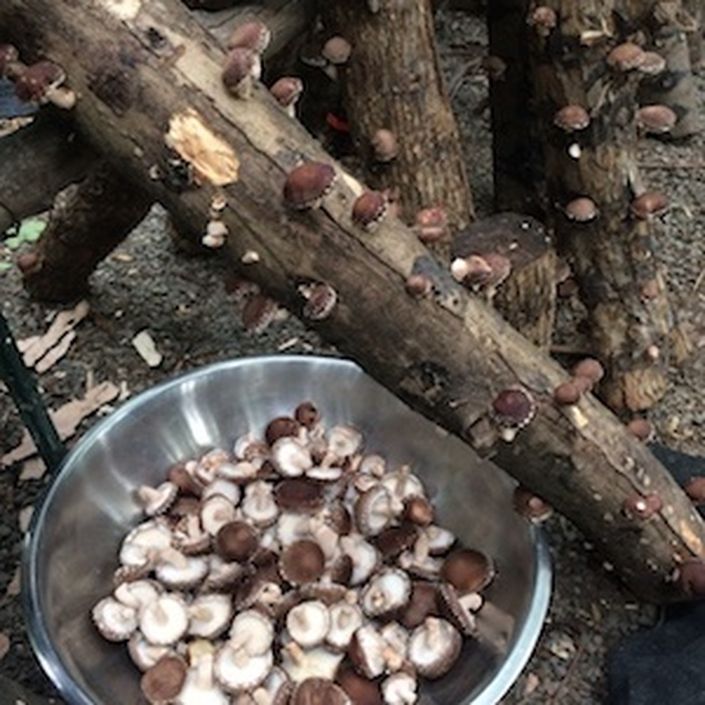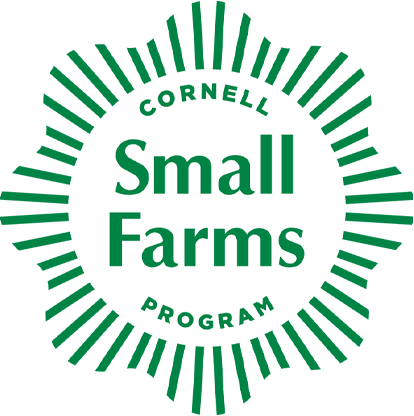
BF 151: Outdoor Mushroom Cultivation
Growing Mushrooms on Logs, Stumps, and Woodchips
Enroll in Course
Learn how to cultivate with the seasons in farms, fields, and gardens
Mushrooms are an emerging niche crop with many benefits, including improving farmer stewardship of forested lands and the ability to offer a unique and highly desired product. With a bit of practice, mushrooms can be easily grown outdoors on many materials and in alignment with the seasonal and cyclical nature of outdoor growing.
This course trains new and experienced farmers in the background, techniques, and economics of outdoor mushroom production. Students will learn the basic biology of mushrooms, cultivation techniques for shiitake, oyster, lions mane, and other easy to grow mushrooms, proper conditions for fruiting outdoors, managing pests and other issues, and harvesting and marketing strategies.
Target Audience
All levels - This course is for new farmers, or experienced farmers seeking to diversify their operations. It’s also relevant to woodlot owners and backyard gardeners, and forest stewards interested in this topic. Growing as a viable economic enterprise will be discussed, though techniques can also be applied at any scale. Mushroom growing is an easy topic for beginners with some experience farming and managing crop systems.
Course Objectives
At the completion of this course, you will:
- Be able to describe the basics of outdoor mushroom production and harvesting
- Have the opportunity to participate in an at-home, hands-on mushroom cultivation experiment
- Connect mushroom cultivation to the management of healthy forests and soils
- Understand the logistics of management, sales, and safety issues related to mushroom farming
- Be empowered to start your own mushroom cultivation journey
Webinars
The bulk of the course happens on your own time, with discussions, readings, and assignments in Teachable, our virtual classroom. To add to the experience, webinars will be woven into the online interface of the course to allow you to meet on a weekly basis to learn from outside presenters and ask questions to address your farm issues in real time. If you miss one, they are always recorded and posted for later viewing.
Webinar Schedule
Live instruction for 2025 has concluded. You are welcome to enroll now to complete this course on a self-paced schedule and join our next live session in 2026.
All webinars from 2025 have been recorded and are posted in your online
classroom to watch anytime. Once enrolled in this course, you will
retain access to all materials indefinitely and may return to participate in future live offerings of the course as well. We hope you will join us!
Your Instructor

Aysha Venjara, a keen observer of nature and longtime gardener, thrives in the small curiosities of the world around us. A Hudson Valley native, she began volunteering on local farms and training in regenerative agricultural practices in 2013. It so happened that her biodynamic studies at the Pfeiffer Center in Chestnut Ridge, NY, were just down the street from the Sufi mosque she attended since childhood. The link between these two fundamental aspects of life, faith and farming, became a topic of deep exploration and formed the start of an incredible journey. In 2016, Aysha became the steward of a beautiful piece of land, 3.5 acres of a former biodynamic dairy farm, and a 1950’s barn, lovingly converted into a home by a designer and musician couple. The Falaha Center for Spiritual Agriculture, whose mission is growing faith, family, and fun through farming, was born out of a calling to both protect and share the gifts of the land and the home—most especially at a time when our connections to the earth, and one another, are under constant assault. Through the Falaha Center, Aysha uses small but thriving farm enterprises, namely log-grown shiitake mushrooms, pastured eggs, and educational workshops, to fund a food pantry garden program, on-farm mentorship for youth groups, and woodland conservation activities. Aysha is also a columnist for dirt magazine, a local Hudson Valley food and farming publication, and a facilitator for the Cornell Small Farms Program Woodland Mushroom Course.
Connor Youngerman is the Agroforestry and Mushroom Lead at Cornell Small Farms Program. His background includes a master’s in agronomy, work in data science, and a lifelong compulsion to plant trees and gardens ( so far in PEI, MA, AZ, VA, NY and HI). Connor is a NY Master Forest Owner Volunteer, and is certified as to forage and sell wild mushrooms. His research and education endeavors focus on woody perennial plant propagation, and novel mushroom substrates.

Student Testimonials
“Hearing what everyone else is coming to the table with was valuable. It sparked some things I never considered before.”
“The case studies and conversations with people actually farming mushrooms was the most helpful for me. I also really appreciate having a source to ask specific questions.”
“I really valued the wealth of knowledge presented, costs, business plans, panelists, the ability to ask questions in real-time and learning where to find resources etc.”
“I appreciated the diversity and thoroughness of the information and resources. The presenters did an excellent job!”
“This class had an interactive aspect and break out rooms that kept us engaged.”
Course Curriculum
-
StartInstructor Contact Information
-
PreviewWebinar Schedule and Participant Guide
-
StartWeekly Webinar Link
-
StartFORUM: Introductions
-
StartOrder Your Mushroom Kit!
-
StartPre-Course Survey
-
PreviewKiva US - 0% Interest Loans up to $15,000
-
StartNavigating in Teachable; Getting a Course Completion Certificate; and More
-
StartWEBINAR LINK, RECORDING, & SLIDES
-
StartReferences for Lecture 1
-
StartFUNGI FORUM
-
StartRESOURCES: CornellMushrooms.org
-
StartCASE STUDY: Mushroom Shed
-
StartOPTIONAL ACTIVITY: Fungi Drawings
-
StartARCHIVE: 2022 January Recording Mycology 101 (59:36)
-
StartShroom Shorts (1:00)
-
StartAmbrook Research: Tough Times for Mushroom Workers
-
StartWEBINAR RECORDING & SLIDES
-
StartFUNGI FORUM
-
StartACTIVITY: Make a Farm Map
-
StartVIDEOS: Woodlanders
-
StartVIDEO: Woodlot Management for Mushrooms (Peter Smallidge - 2020)
-
StartVIDEO: Sourcing Logs for Mushroom Cultivation (Steve - 2021)
-
StartCASE STUDY: Oliva Watkins of Oliver's Agroforest (NC)
-
StartShroom Shorts (0:58)
Frequently Asked Questions
Online Course Tiered Pricing
The Cornell Small Farms Program offers a tiered pricing model to provide greater access to our online courses. To determine your course enrollment cost, please consult the chart below, and honestly identify your current financial situation.
We realize that not everyone is able to afford the price of our courses, so we also offer a small number of scholarships each year to New York State residents. To apply, please read scholarship requirements and complete the application here.
